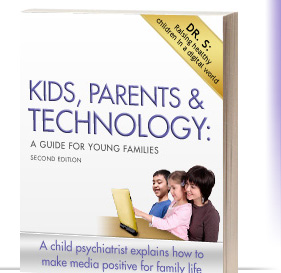Link to Original Article
12.30.09
Media consumption: Does it have to be all or nothing? Can we find ways to fit tech tools into our lives sensibly and selectively in ways that actually work for us? In other words, does it have to be feast or famine? Why not figure out sensible diets that allow us (and teach our kids) to consume media rather than having media consume us? Are there experts we can ask about the best ways to adapt our own media diets?
The benefits in so many ways are enormous. But the dazzling growth of accessible digital media has been driving us helter-skelter. The forces let loose are not necessarily healthy. We are so dazzled by digital gadgets (and they truly are amazing!) that we forget to consider seriously how these will eventually impact our children and family lives — and ultimately the picture is not at all pretty.
Families with more media at home have less interpersonal interactions. Media-soaked digital kids are awash in gadgets from earlier and earlier ages, and most are unsupervised and consume mostly junk. Social, mobile, interactive robotic dolls will soon visit our children’s playpens and cribs. Parents feel helpless because they do not know — except for restricting and filtering — how to guide media-saturated kids’ into healthy media consumption. Social media are full of clutter, but the noise is intrusive, overwhelming, and often trivial — and actually often distracts us from and dilutes truly gratifying authentic human contact.
Technology has brought lots of good stuff that can go into a healthy media diet that will actually enhance our lives — in moderation and the right proportions. I wrote KIDS, PARENTS & TECHNOLOGY: A GUIDE FOR YOUNG FAMILIES to guide parents pay the right kind of attention systematically and comprehensively to promote healthy media consumption in the home from early life.
We some thought, we can commit themselves to pay attention to how we use media at home and elsewhere. We can become more balanced consumers of information and media to enhance or relationships, values, socialization, and intellectual development, yet and still have fun.



Daring to Live Your Life Offline
Link to Original Article
12.30.09
Media consumption: Does it have to be all or nothing? Can we find ways to fit tech tools into our lives sensibly and selectively in ways that actually work for us? In other words, does it have to be feast or famine? Why not figure out sensible diets that allow us (and teach our kids) to consume media rather than having media consume us? Are there experts we can ask about the best ways to adapt our own media diets?
The benefits in so many ways are enormous. But the dazzling growth of accessible digital media has been driving us helter-skelter. The forces let loose are not necessarily healthy. We are so dazzled by digital gadgets (and they truly are amazing!) that we forget to consider seriously how these will eventually impact our children and family lives — and ultimately the picture is not at all pretty.
Families with more media at home have less interpersonal interactions. Media-soaked digital kids are awash in gadgets from earlier and earlier ages, and most are unsupervised and consume mostly junk. Social, mobile, interactive robotic dolls will soon visit our children’s playpens and cribs. Parents feel helpless because they do not know — except for restricting and filtering — how to guide media-saturated kids’ into healthy media consumption. Social media are full of clutter, but the noise is intrusive, overwhelming, and often trivial — and actually often distracts us from and dilutes truly gratifying authentic human contact.
Technology has brought lots of good stuff that can go into a healthy media diet that will actually enhance our lives — in moderation and the right proportions. I wrote KIDS, PARENTS & TECHNOLOGY: A GUIDE FOR YOUNG FAMILIES to guide parents pay the right kind of attention systematically and comprehensively to promote healthy media consumption in the home from early life.
We some thought, we can commit themselves to pay attention to how we use media at home and elsewhere. We can become more balanced consumers of information and media to enhance or relationships, values, socialization, and intellectual development, yet and still have fun.